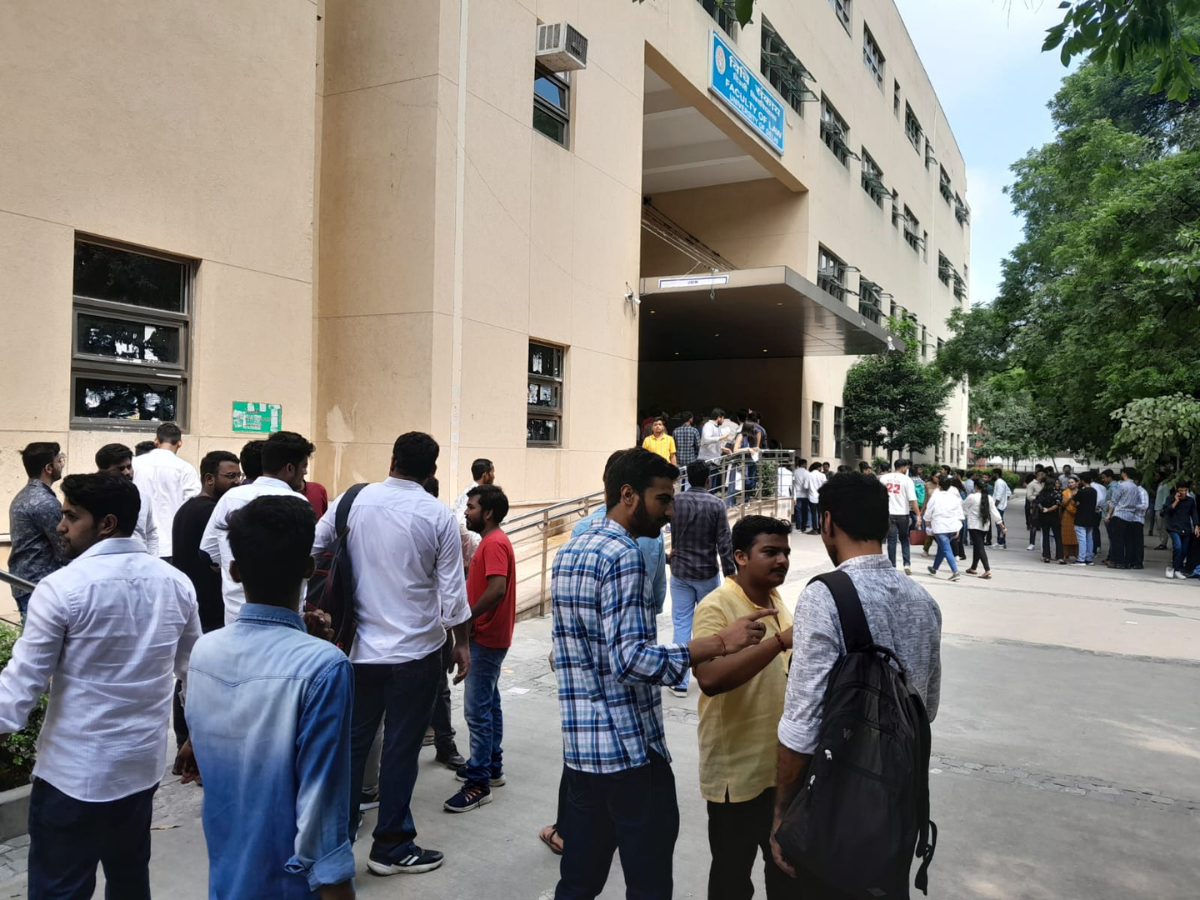
The counting of votes for DUSU elections will take place on September 23
Delhi University students turned out in significant numbers for the students’ union election, marking the resurgence of campus politics after a three-year hiatus due to the Covid-19 pandemic.
Approximately 1,00,000 eligible students participated, amid vigorous campaigning by various student organisations and heightened security measures.
In order to ensure fairness, all posters and hoardings of candidates were removed in accordance with the model code of conduct. Unlike college union elections that used traditional ballot papers and were also held on Friday, the DUSU (Delhi University Students’ Union) election employed electronic voting machines (EVMs).
A total of 23 candidates vied for positions of president, vice-president, secretary, and joint secretary, with 11 of them being women. The Akhil Bharatiya Vidyarthi Parishad (ABVP), affiliated with RSS, and the National Students’ Union of India (NSUI), the Congress party’s student wing, are strong contenders.
Leftist organisations like the All India Students Association (AISA) and Students’ Federation of India (SFI) were also in the running.
In the 2019 election, ABVP secured three seats, and NSUI won the joint secretary position. The university conducted training sessions for teachers and staff in collaboration with Electronics Corporation of India Limited (ECIL) to ensure election’s integrity.
Polling took place from 8:30 AM to 1 PM for day classes and from 3 PM to 7:30 PM for evening classes. Vote counting is scheduled for September 23 at the conference centre.
With 24 candidates participating this time, the campus was abuzz with students exercising their voting rights. Major student organisations, including ABVP, NSUI, SFI, and AISA, fielded candidates for all four positions.
A presidential candidate of law college told Patriot, “My primary emphasis, if elected, will be on improving placement opportunities for our students.”
A vice-presidential candidate of the same college asserted, “We aim to facilitate the translation of educational materials into Hindi, a resource currently unavailable.”
In response to questions about harassment, she said, “Regarding harassment concerns, it is my belief that our students possess the maturity to handle such situations adeptly.”
VP candidate Dhruv highlighted a pressing issue, stating, “Out of the 1,100 students who enroll, a significant number struggle to achieve even a 60% pass rate in exams, a critical concern I pledge to address as part of my main manifesto.”
A student from Ramjas College expressed his disappointment by saying, “I cast my vote for ‘NOTA’ on all four positions because I don’t believe in any of the candidates from any of the parties.
“I am really disappointed. None of the parties are cleaning up; they are just scattering garbage (pointing towards the roads filled with pamphlets). I actually wanted to vote for an independent candidate, but they couldn’t market themselves due to lack of funds. They only came once and those who are campaigning aggressively (ABVP and NSUI), they are just causing disturbance. They even fought each other a day or two ago,” the student added.
Another postgraduate student who couldn’t cast her vote due to an ID card issue said, “It’s very frustrating that an ABVP member entered Miranda House (her college at undergraduate level) without permission and misbehaved.”
A 3rd-year student from Ramjas College shared her thoughts after voting, “The atmosphere during DUSU elections is always like this. They scatter pamphlets everywhere, but they don’t really do anything except run for office with the same promises.
“The disappointment in college elections is that people aren’t very politically aware. Sometimes, candidates win in Ramjas who don’t even deserve it. There should be a better selection process for the candidates so that everyone can choose their representative. The election is happening after three years, but students are not well-informed, which is quite sad,” the student added.
The issue of harassment, especially during DUSU campaigns and roadshows, remains a major concern for female students. However, they feel that the authorities are not taking proper action. Additionally, concerns about canteen facilities and the National Education Policy (NEP) were highlighted as important topics for the union to address.
Meanwhile, there were allegations of favouritism against election in-charge Professor Shabnam, particularly in support of candidate Prince Kumar for the position of president. Some questioned why only Kumar’s name appeared on pamphlets. When asked, Professor Shabnam responded with “To kya hua (So what)”.
Protesting students gathered outside the law faculty gate, staging a dharna (sit-in protest) and chanting slogans against perceived authoritarianism within the university administration.
Professor Shabnam, election in-charge, did not respond to repeated calls from this reporter.
Five quiet corners across Delhi-NCR where February evenings slow the city down, letting breeze, fading…
A solo exhibition by Anjali Mittal exploring emotion, memory and intuition through layered blue-hued paintings
The incident occurred on Saturday near Bakhtawarpur. A senior police officer said a team rushed…
V K Saxena approves 20 per cent reservation, age relaxation, and test exemption for ex-Agniveers…
The fair at Gandhi Darshan brings together emerging and senior artists, showcasing over 200 artworks…
State Names Authority approves renaming of two metro stations and modifies seven others, aligning station…